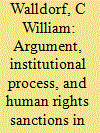| Srl | Item |
| 1 |
ID:
101380


|
|
|
|
|
| Publication |
2010.
|
| Summary/Abstract |
When do humanitarian norms lead great powers, especially democracies, to impose sanctions against strategic partners and allies? I argue that answering more specific questions like this in space and time requires constructivists to focus greater attention on institutional and ideational process. Agents are central to policy change. But the ideational and institutional context in which agents build arguments determines when this change is more or less likely. In this vein, I argue that three factors in liberal states - legislatures, the nature of activist pressure, and strategic ideas - explain when humanitarian norms produce sanctions. I demonstrate the argument through a study of US Cold War relations with South Africa, Turkey, and Greece. Among other contributions, this article demonstrates how attention to process can extend the constructivist agenda into a series of new empirical domains and open avenues for contributions to important policy debates.
|
|
|
|
|
|
|
|
|
|
|
|
|
|
|
|
| 2 |
ID:
069878


|
|
|
|
|
| Publication |
2005.
|
| Summary/Abstract |
For all of the recent advances in the study of humanitarian norms in international relations, the prevailing sentiment remains that human rights are subordinate to other interests, especially strategic, in great power foreign policy making. This article seeks to lay the foundation to qualify this extant pessimism. It does so through a study of strategic commitments. Focusing specifically on security assistance in Latin America during the Cold War, this study assesses when and how humanitarian norms are most likely to lead democratic states to terminate these types of pledges. In so doing, it contributes to the growing literature on democratic commitments, furthers our understanding of non-governmental organization influence on international politics, and, most importantly, lays the theoretical basis for better assessing the extent to which humanitarian norms frame relationships between democracies and strategic partners.
|
|
|
|
|
|
|
|
|
|
|
|
|
|
|
|